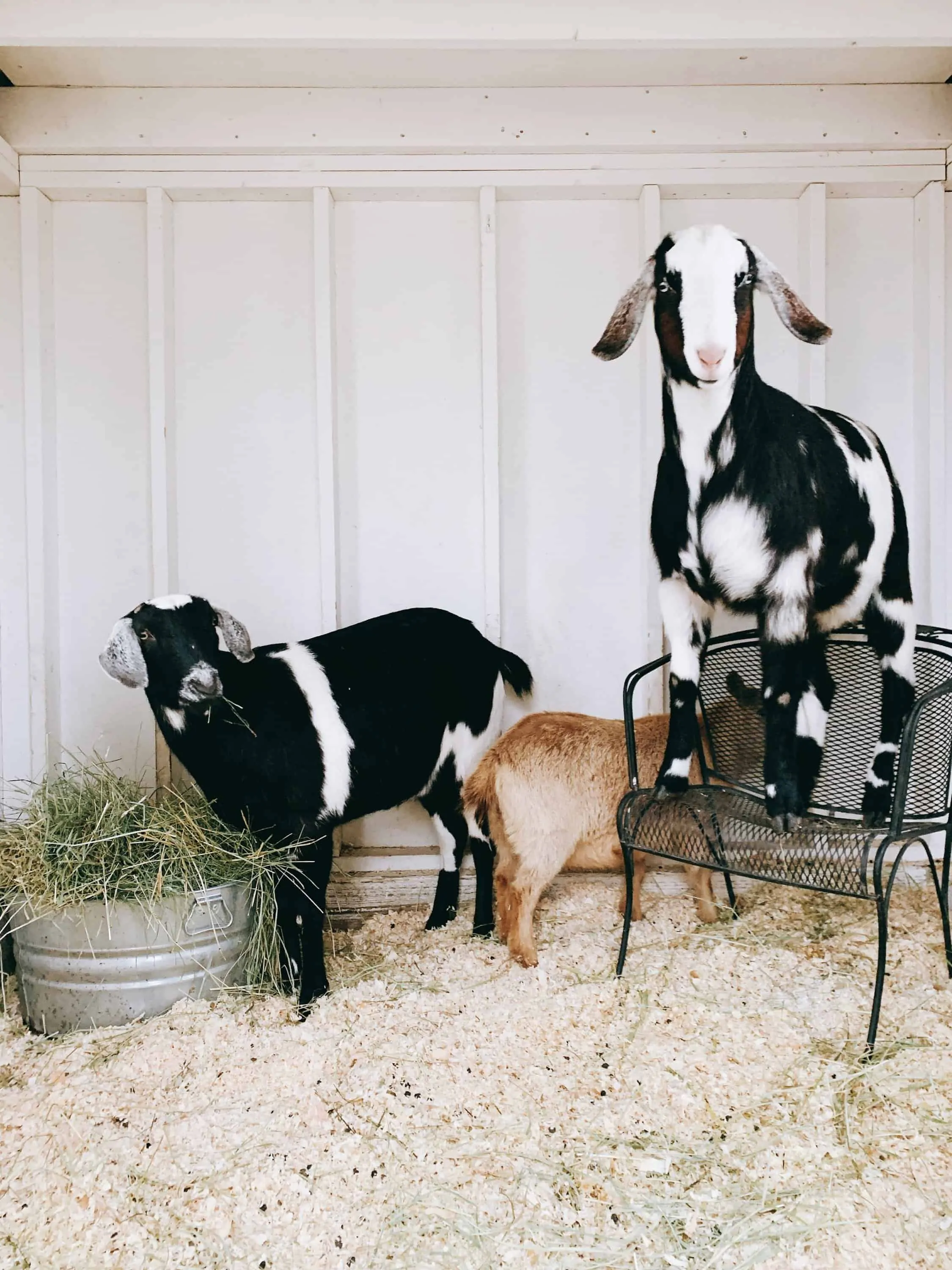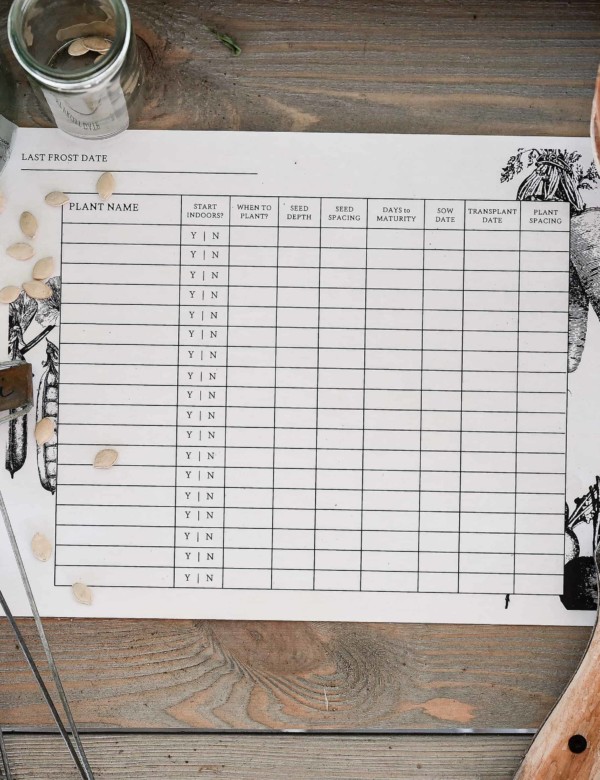Raising goats is so much easier when you have the right supplies! These are some of the supplies I use to help keep my goats healthy and happy!
Supplies you need for raising goats:
If you have goats or are considering raising goats, you should know that goat’s basic needs are: shelter, water, and food. Goats need protection from the elements, and constant access to fresh water, but one of the most important elements of raising goats is proper nutrition.
If you’ve read my post about 15 things I wish I knew before getting goats, you know there’s a lot more to raising goats than just feeding them!
If you maintain the three basic elements, your goats will stay healthy without much work! However, there are some other necessary things you should know to raise healthy goats!
Today I am sharing some of my favorite supplies I use to raise my goats! I hope this post is helpful, please let me know if you have any questions or if there is anything you think I should add to this list!
This post is for reference only. Please consult a veterinarian before administering ANY medications to your animal. It is easy to misdiagnose a goat, so it’s always best to gather as much information as possible before acting.
Mineral
Mineral is a very important aspect to a goat’s diet and is necessary for keeping your goat healthy! However, mineral comes in many different forms, so make sure to source your mineral from a local feed supply store.
Why? Because mineral is necessary to make up for the lack of vitamins and minerals in their everyday diet. This is going to differ from one location to another and will not be the same for Californians as it is for Nevadans and so on…
While you can purchase mineral from a large chain store, I advise against doing so. Instead, visit your local vet or feed store and ask if they have GOAT mineral for your area. It’s very very very important to only feed goats mineral developed for them, do not feed goats mineral that is meant for another type of animal.
Thermometer
Perhaps one of the most important tools you need when raising goats is a thermometer. If your goat comes down with something, which will probably happen at some point, the first step in determining what is wrong with your goat is by taking its temperature.

Hoof trimmers
These hoof trimmers are known to be the best. Hoof trimming is necessary for all goats, some goats’ hooves grow more quickly than others, so the frequency depends on your animal’s need. For me, twice a year is sufficient. Many goat owners are able to trim their goats’ hooves on their own, but I am not able to do that!
Buckwheat and Alfalfa are particularly strong and there is no way I could trim their hooves on my own. Twice a year our vet makes a house visit to vaccinate all of the animals (cats, dog, horses, goats, etc…), during these visits I also have the goats’ hooves trimmed.
Trimming is a very important part of raising goats, but can severely damage the goats’ hooves if done improperly. Make sure that you have someone knowledgable to teach you how to properly trim hooves if you’d like to do this task on your own. Be very careful with the hoof trimmers, they are incredibly sharp and when a goat wiggles around, it’s very easy to stab yourself (I’ve done it!).
Needles & Syringes
At some point of another you’re going to have to give your goat an injection, and having needles and syringes on hand will save you the stress of having to track some down when you need them! You can pick some up from your vets office and just keep them on hand for times of need.
If you’ve never given an injection before, consult your vet and ask for a lesson, or ask for help from someone that is experienced! It is a bit intimidating, but sometimes it’s necessary to save an animal, so knowing how to give an injection is a valuable skill.
It’s also very nice to have 5 mL syringes on hand for administering oral medications.
De-Wormer
Goats are incredibly sensitive to worms and it’s very important to monitor them for anemia. This can be done in two ways. 1. Check their FAMACHA score, and 2. fecal analysis. I check my goats’ eyelids roughly every week, and bring in fecal samples for testing two or three times a year. Worms are definitely not something you should take lightly because they can kill a goat quickly.
Some believe in de-worming naturally with herbs, and some believe in using de-wormers. This is a decision you can make on your own. I de-worm my goats with medical de-wormer once a year and if needed, a second time. This can be done in spring and fall, spring being the primary time after all of the bugs wake up from their winter nap.
You will find many de-wormers available online and at feed stores; however, it’s very important that you work with a knowledgable veterinarian in your area to determine which de-wormer is best for the parasites in your area. Some de-wormers are only effective in certain areas of the country, so before buying de-wormer or administering anything, talk to your vet.
Here in northern California Ivermectin is the best dewormer which is given as an injection, our vet does this for me because it is pretty painful for the goats and I hate doing it! A necessary evil :(.
Probiotics
Goats are ruminants and keeping the pH in their rumen balanced is they key to a happy and healthy goat. Sometimes stress can cause the pH to become unbalanced – weather, additions to the herd, food change, etc… Probiotics are a great way to help boost a goat’s rumen during times of stress to prevent illness.
Iodine
Iodine (or beta-dine) is a basic disinfecting solution that is very helpful in fully cleaning minor wounds. You’ll want to have this on hand for those times when your goat gets into a predicament it shouldn’t be! This is a surgical prep solution that disinfects entirely!
Vet Wrap
Vet wrap and gauze are two items to always keep on hand when raising goats (and horses for that manner). Whether you need to keep a wound wrapped or use vet wrap to bandage an injured goat, you will be grateful to have this on hand!
Wheelbarrow, Shovel & Pitchfork:
Having a heavy duty, big wheelbarrow is one of the top supplies I suggest having for your goat pen! This makes cleaning out the goat barn so much quicker! A good quality scoop shovel is also important to help you clean the barn quickly! During the winter months, I find that a pitchfork is very nice to have because the goats eat in the barn more often and spill hay everywhere, and a pitchfork is easier to clean with than a shovel!
Sweet PDZ
Goats have very sensitive lungs and can become ill easily if kept in a dirty barn! Goats also pee a lot… The ammonia in their urine can be toxic, but Sweet PDZ helps absorb and eliminate the toxic odors!
How to use Sweet PDZ? Sprinkle a generous layer of the granules on the floor of their shelter, then top with straw or bedding.
Vitamin B and Vitamin C Injectable
Vitamin B is essential for goat’s metabolism and neurological health. If a goat becomes ill, a dosage of vit B & C is almost always helpful. I like to keep a bottle of each in our fridge ready to administer when needed. Goat polio is treated with vitamin B, read more about goat polio. Copper toxicity can be initially treated with vitamin C injections, although the outcome may vary.
Medications:
You may find that some medications are helpful to keep on hand. Often times goats come down with something on a holiday or in the middle of the night and vet care isn’t possible. This is a great list of goat medications. Before administering any medications, consult with a veterinarian, it’s easy to misdiagnose a goat, so please make sure that your vet is helping you understand your goat’s needs!
DOWNLOAD THE FREE EBOOK
I hope that this post has been helpful! The links in this post are affiliate links, and buying products directly from these links truly helps me, thank you so much for your support of this blog! If you found this post helpful, be sure to pin one of the images to save it for later!




What a great guide! Thanks for sharing. I’m definitely saving this for when we have our own land and can have more animals.
I agree with you! Thanks for the post and the valuable information in it. I am doing research on organic health supplements in the U.S.
Love this list! We haven’t used iodine yet for our goats, but we use it frequently for our dogs. Our frenchies get frequent methicillin resistant skin infections, and we use iodine baths as a natural way to treat the infections without antibiotics. So many uses for iodine! :)
Very informative! We have sheep, and have thought about getting goats for milk and to clean up brush!!
Great info. The area in which I want to house the goats is damp and doesnt get a lot of sun(in process of clearing) will the mosquitoes and nats be a problem….
Very interesting info!
Thanks for the info!
cool thanks
I would also like to borrow an e-book. Because for now I read everything through a laptop. I was very uncomfortable reading information from a huge device. I really don’t know which one to buy, there are too many brands.
I would also like to borrow an e-book. Because for now I read everything through a laptop. I was very uncomfortable reading information from a huge device. I really don’t know which one to buy, there are too many brands.
thank you it was so helpful for me because I might be getting 2 Saanen goats soon
Love this guide. Thank you
If you are looking for an all-in-one solution for a cleaner internet, I highly recommend installing stands adblocker. This powerful tool effectively eliminates all types of intrusive ads, including banners, pop-ups, and malware-tainted scripts. Unlike many other options, it is designed to be lightweight, ensuring your browser remains fast and responsive while you surf the web. Additionally, it prioritizes your digital security by blocking trackers that attempt to collect your personal data. It is a reliable choice for anyone who values speed, privacy, and an uninterrupted online experience.